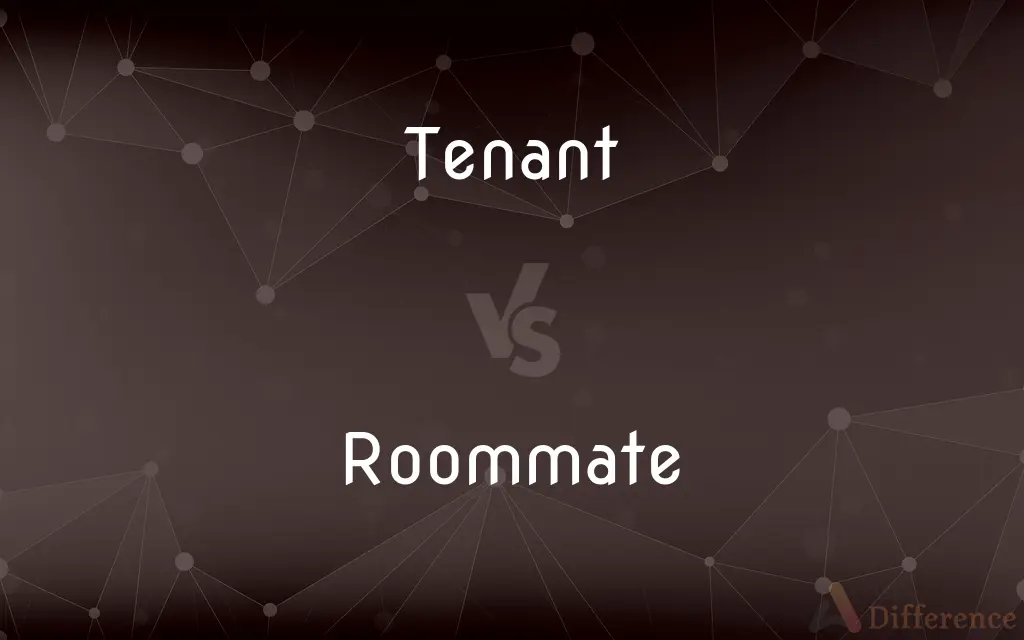Tenant vs. Roommate — What's the Difference?
By Fiza Rafique & Maham Liaqat — Updated on April 15, 2024
A tenant holds a legal agreement to occupy rented property, usually alone or with others, whereas a roommate shares living space with another, often sharing expenses without individual lease agreements.

Difference Between Tenant and Roommate
Table of Contents
ADVERTISEMENT
Key Differences
A tenant is someone who enters into a formal lease agreement with a landlord to rent property, which could be an apartment, a house, or a commercial space. Whereas, a roommate is typically someone who lives with one or more persons in a shared residential arrangement, which may or may not include being part of the lease.
Tenants have specific legal rights and responsibilities defined by their lease agreement, including the payment of rent directly to the landlord and upkeep of the property. On the other hand, roommates may share these responsibilities among themselves, but not all roommates have direct legal obligations to the landlord, especially if they aren't on the lease.
In terms of privacy and control, tenants generally have more autonomy over the property, depending on their lease. Meanwhile, roommates must negotiate shared space and resources, often requiring more communication and compromise.
From a financial perspective, tenants are responsible for the full amount of rent and utilities or any other expenses as outlined in their lease. Conversely, roommates typically split these costs, which can make individual financial contributions lower than if living alone as a tenant.
Regarding legal protection, tenants are protected under tenant laws that provide rights against eviction and other forms of landlord abuse. In contrast, roommates’ protections can vary significantly; those not named on a lease have fewer guarantees and may depend on internal agreements for their housing security.
ADVERTISEMENT
Comparison Chart
Legal Agreement
Has a lease directly with a landlord.
May not have a formal agreement with a landlord.
Financial Responsibility
Responsible for full rent and expenses.
Shares rent and expenses with others.
Legal Protection
Protected by tenant laws.
Protection varies; less if not on lease.
Control over Property
High control and privacy depending on the lease.
Limited, shared control and reduced privacy.
Relationship to Property
Direct relationship to the landlord and property.
Indirect, often mediated through another tenant.
Compare with Definitions
Tenant
Holds legal rights to occupy the rented space.
As a tenant, he has the right to a habitable living environment.
Roommate
Requires mutual agreement on living conditions and rules.
The roommates agreed on quiet hours during weekdays.
Tenant
Directly responsible for paying rent to the landlord.
The tenant ensures her rent is paid in full each month.
Roommate
May or may not be included on a formal lease.
Since he's not on the lease, the roommate's stay is more informal.
Tenant
A person who rents land or property from a landlord under a lease.
The tenant signed a one-year lease for the apartment.
Roommate
Typically involved in shared living arrangements without direct legal obligations to a landlord.
They decided to live as roommates to save on living costs.
Tenant
May sublet the property to others, if permitted by the lease.
The tenant obtained permission to sublet a room to help cover expenses.
Roommate
A person who shares a living facility such as an apartment with another.
Her roommate helps split the cost of utilities and rent.
Tenant
Can be an individual or a group of people on the same lease.
The tenants of the house are all listed on the lease agreement.
Roommate
Shares responsibilities for living expenses.
Roommates often split the cost of groceries and other common supplies.
Tenant
One that pays rent to use or occupy land, a building, or other property owned by another.
Roommate
A roommate is a person with whom one shares a living facility such as a room or dormitory except when being family or romantically involved. Similar terms include dormmate, suitemate, housemate, or flatmate ("flat": the usual term in British English for an apartment).
Tenant
A dweller in a place; an occupant.
Roommate
A person with whom one shares a room or rooms.
Tenant
To hold as a tenant or be a tenant.
Roommate
A person with whom one shares a room, as at university, etc.
Tenant
One who holds a lease (a tenancy).
Roommate
A person (UK: flatmate, housemate, AU: sharemate) sharing the same home (sharehome).
Tenant
(by extension) One who has possession of any place.
Roommate
One of two or more occupying the same room or rooms; one who shares the occupancy of a room or rooms; a chum.
Tenant
(computing) Any of a number of customers serviced through the same instance of an application.
Multi-tenant hosting
Roommate
An associate who shares a room with you
Tenant
One who holds a feudal tenure in real property.
Tenant
One who owns real estate other than via allodial title.
Tenant
Misconstruction of tenet
Tenant
To hold as, or be, a tenant.
Tenant
(transitive) To inhabit.
Tenant
One who holds or possesses lands, or other real estate, by any kind of right, whether in fee simple, in common, in severalty, for life, for years, or at will; also, one who has the occupation or temporary possession of lands or tenements the title of which is in another; - correlative to landlord. See Citation from Blackstone, under Tenement, 2.
Tenant
One who has possession of any place; a dweller; an occupant.
The hhappy tenant of your shade.
The sister tenants of the middle deep.
Tenant
To hold, occupy, or possess as a tenant.
Sir Roger's estate is tenanted by persons who have served him or his ancestors.
Tenant
Someone who pays rent to use land or a building or a car that is owned by someone else;
The landlord can evict a tenant who doesn't pay the rent
Tenant
A holder of buildings or lands by any kind of title (as ownership or lease)
Tenant
Any occupant who dwells in a place
Tenant
Occupy as a tenant
Common Curiosities
What legal protections do tenants have that roommates do not?
Tenants are protected by housing laws that may include rights against unjust evictions and the guarantee of habitable conditions, which non-lease-holding roommates might not have.
What is the main difference between a tenant and a roommate?
The main difference is that a tenant has a legal agreement directly with the landlord, while a roommate may not.
How do roommates split costs typically?
Roommates typically split costs like rent, utilities, and other shared expenses evenly or based on agreed terms.
Do all roommates need to sign the lease?
It's not mandatory, but it's safer for all roommates to be on the lease to ensure equal rights and protections.
Are tenants responsible for the actions of their roommates?
If the roommates are not on the lease, the tenant can be held responsible for any breaches of the lease caused by their roommates.
Can a roommate become a tenant?
Yes, a roommate can become a tenant if they enter into a lease agreement with the landlord.
How can roommates ensure their rights without being on the lease?
Roommates can protect themselves by having a written agreement with the tenant and possibly being added to the lease.
Can a tenant also be a roommate?
Yes, a tenant can also be a roommate if they share the rented property with others.
What should be considered before becoming a roommate with someone?
Consider the financial stability, lifestyle compatibility, and responsibilities each roommate will have before entering the arrangement.
What happens if a tenant wants to move out but the roommate wants to stay?
This situation typically requires finding a replacement tenant or roommate who can take over the lease terms or negotiating a new arrangement with the landlord.
Share Your Discovery

Previous Comparison
Fidelity vs. Veracity
Next Comparison
Boro vs. BoroughAuthor Spotlight
Written by
Fiza RafiqueFiza Rafique is a skilled content writer at AskDifference.com, where she meticulously refines and enhances written pieces. Drawing from her vast editorial expertise, Fiza ensures clarity, accuracy, and precision in every article. Passionate about language, she continually seeks to elevate the quality of content for readers worldwide.
Co-written by
Maham Liaqat















































